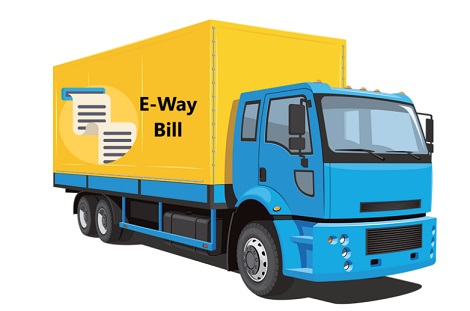The consequences of not generating & carrying the E-Way bill can result in both monetary and non-monetary penalties to the taxpayer. Non-compliance with the e-way bill is a costly affair.
1. Monetary penalty
Transporting goods without an invoice and E-way bill constitutes an offence and attracts a penalty higher of:
- Rs. 10,000 or
- The tax sought to be evaded (i.e. tax to be hidden)
In simple words, the penalty for non-generating e-way bill is Rs 10,000. However, the given penalty can also be extended to Rs 25,000 if the registered person is caught acquiring possession of, or in any way dealing with goods liable to confiscation.
2. Detention and Seizure (Non-compliance with e-way bill provisions)
The vehicle transporting the taxable or exempt goods without an E-way bill can be detained or seized and would be released only on payment of the appropriate tax and penalty as specified by the officer.
Summary of the penalty is as follows:
Summary of the penalty is as follows:
| Situations | Before 01/01/2022 | On or after 01/01/2022 [No. 39/2021-C.T., 21/12/2021] |
|---|---|---|
|
Section 129(1)(a) – |
Taxable Goods: Tax + penalty = 100% of tax payable | Taxable Goods: Penalty = 200% of tax payable |
| Exempted Goods: Penalty = 2% of the value of goods or ₹25,000, whichever is less. | Exempted Goods: Penalty = 2% of the value of goods or ₹25,000, whichever is less. | |
|
Section 129(1)(b) – |
Taxable Goods: Tax + penalty = 50% of the value of goods, reduced by tax paid | Taxable Goods: Penalty = higher of 50% of the value of goods or 200% of the tax payable |
| Exempted Goods: Penalty = 5% of the value of goods or ₹25,000, whichever is less. | Exempted Goods: Penalty = 5% of the value of goods or ₹25,000, whichever is less. |
3. Non payment of above mentioned Penalty
- If the penalty is not paid within 15 days from receiving the notice, the goods or conveyance may be sold or disposed of to recover the penalty.
- If the penalty is not paid, the transporter may be required to pay Rs. 1 lakh (whichever is less) for releasing the conveyance.
- Perishable or Hazardous Goods: For goods that are perishable or likely to lose value quickly, the 15-day period can be reduced by the officer.
4. Penalty on minor mistakes in E-Way Bill
Following situations will be considered as minor mistakes in E-way bill:
- (a) Spelling mistake in the name of consignor / consignee, but GSTN No. wherever applicable, is correct.
- (b) Error in PIN Code, but the address of the consignor/consignee is correct, provided the error does not affect the validity period of the e-way bill.
- (c) Error in the address of the consignee, to the extent that locality and other details are correct.
- (d) Error in one or two digits of the document numbers mentioned in the e-way bill.
- (e) Error in the 4 or 6 digit level of HSN, where the first 2 digits are correct and the rate of tax mentioned is correct.
- (f) Error in the one or two digits/characters of the vehicle number.
It is pertinent to note that in all the above cases, the person in charge of the vehicle should be in possession of the e-way bill / tax invoice or delivery challan along with the consignment of goods.
Penalty of Rs. 500/- for CGST and Rs. 500/- for SGST (total Rs. 1000/-) for minor errors will be imposed on the consignor / consignee or the person in charge of the vehicle.
(Circular No. 64/38/2018-GST dated 14.09.2018)
References:
Section 68 of the CGST Act
Section 122(1)(xiv) of the CGST Act
Section 125 of the CGST Act
Section 129 of the CGST Act
Rule 138 of the E-Way Bill Rules


